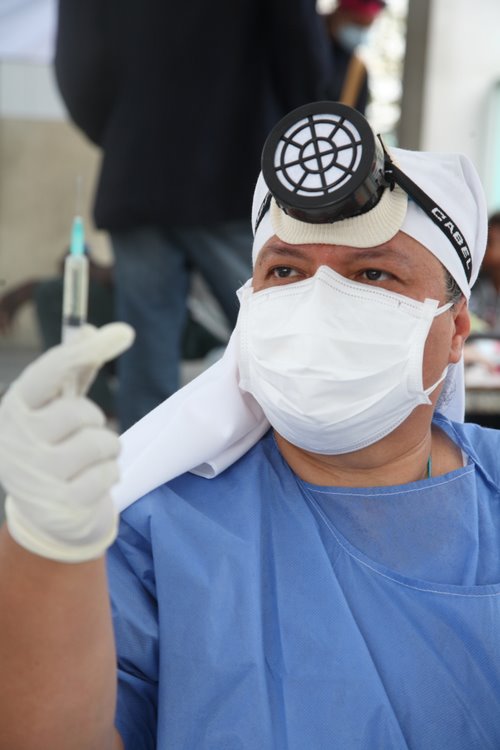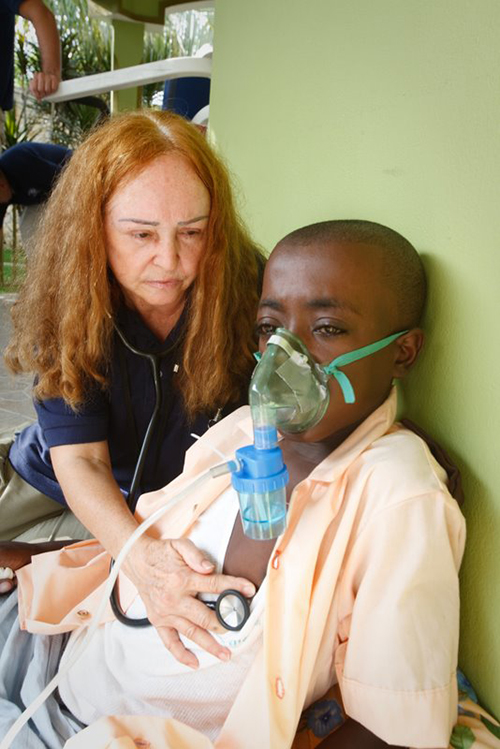By Tom Tracy - Florida Catholic
MIAMI | Norman Ruiz-Castañeda, a permanent deacon at Epiphany Parish in South Miami and a pediatrician with a busy private office, said his practice has shifted rapidly to mostly telemedicine in response to the growing COVID-19 pandemic.
The transition enables Dr. Ruiz-Castaneda and his staff to still have face-to-face consultations with 20 percent of his pediatric clients, who are high priority, while consulting the remaining 80 percent through a telemedicine portal online.
But it is unclear how long this arrangement can continue in terms of a business model and how long the practice can continue keeping office hours if the outbreak becomes an increasing threat to his medical and support staff.

Photographer: FILE | Tom Tracy
A doctor wears protective gear while treating patients a few days after the Jan. 12, 2010 earthquake in Port-au-Prince, Haiti. Such protective gear has been in short supply as the coronavirus has made its way around the world.
“It has made a dramatic change. We are trying to do the best we can in our Catholic and Christian faith traditions to protect the vulnerable and provide care for those who need it,” said Dr. Ruiz-Castañeda, who is also vice-president of the Miami chapter of the Catholic Medical Association.
“We are basically screening everyone by telemedicine on the computer to make sure no one who has symptoms of COVID is coming in,” he said, adding that a sign on the front door reminds patients with any coronavirus symptoms not to enter the facility. All other appointments are told to arrive with only one other family member or caregiver.
“We have regular (surgical) masks but not the N95 masks,” Dr. Ruiz- Castañeda said. “It is possible that we may need to shut down the office operation completely if we don't have the staff to work or if they get sick. So now it is also a matter of trying to protect our staff.”
If his practice does close its doors, he said he will continue working by telemedicine from home, “to be here for the patients and hold their hand through this time and be there for our staff.”
On a personal note, Dr. Ruiz-Castañeda, 67, said his family and four children are worried about his own safety, but he reminds them that everything is in God’s hands while he is also taking all reasonable precautions.
“We work to serve those around us, but we also take care of ourselves so that we don't put ourselves at risk. People who are not at high risk need to think of others who are,” he said, adding that the general public should stay indoors but connected by phone and email with others, especially the elderly who are experiencing loneliness.
“I am telling my patients to stay away from their grandparents but do stay in touch with them so that they don’t become lonely and isolated and that is a big issue here. We don't want the elderly to feel like the lepers in biblical times.”
THE FRONT LINES
In Coral Gables, Dr. Felipe Vizcarrondo, a retired pediatric cardiologist and president of the Miami chapter of the Catholic Medical Association, said he is very concerned about working healthcare professionals. He currently teaches bioethics at the University of Miami’s Miller School of Medicine.
“The people in the front lines are receiving a much larger dose of the virus while taking care of sick people than we outside the medical environment, so we need to take care of the people on the front lines,” Dr. Vizcarrondo said, noting that a number of doctors and priests in Italy have succumbed to the pandemic.

Photographer: FILE | Tom Tracy
A medic works with a patient with breathing problems a few months after the Jan. 12, 2010 earthquake in Port-au-Prince, Haiti. Patients with coronavirus often need much more help to breathe: ventilators that are also in short supply.
“Sometimes when you are involved in a crisis like this you forget the reason we are here, but our final destination is eternal life so we need to focus on that and protect ourselves and our families so we can live the long life the Lord wants for us,” he said. “Meanwhile, we are in the middle of the battle — and it is a battle.”
Thus far, Dr. Vizcarrondo said he thinks the South Florida healthcare infrastructure is in good shape, so long as this region doesn’t explode into a pandemic epicenter.
“The spike (of new cases) could either rapidly come down or taper down just a little bit, so with the mitigation going and most people following (social distancing), I think maybe by mid-April we will see a decline in the frequency.”
In Clearwater, Dr. Diane Gowski, Florida State Director of the Catholic Medical Association and a hospitalist/internal medicine specialist, said even before COVID-19 she routinely took precautions to protect herself by wearing gloves and masks when attending to patients with the flu or pneumonia.
But she said there is alarm at the dwindling national supply of personal protective gear. “Even the regular surgical masks are hard to find; medical supply stores don't have it,” Dr. Gowski said.
CMA members in her region practice medicine in a variety of capacities, she noted, but “pulmonologists are really in the front lines and I can say people are already being exposed. I don't think there is a sense of fear: The Lord is with us, and we use our protective gear, do the best we can and try to be prudent.”
With Sunday Masses canceled, Dr. Gowski said she turns to other faith practices including the rosary, a miraculous medal, a brown scapular and a St. Benedict medal.
This is also a time for quick prayers that medics can recite while running between appointments.
FORTITUDE
As for the trajectory of the pandemic, Dr. Gorski said she has no crystal ball but eventually it will end.
“Our Lord will bring us through this but personally I think it will be not sooner than later. Prayer can shorten this time — and a lot of people are calling for prayer and praying,” she said, adding that the lives of St. Joseph and St. Padre Pio offer her inspiration.
“The virtue of fortitude is key. This is a time to practice and develop that virtue. That helps us stand firm and remain constant as we try to be good and do our duties, to take care of ourselves, our families and our patients,” she said. “The Catechism of the Catholic Church states that fortitude enables us to conquer fear even of our own development of illness that could be life threatening.”
Dr. Joseph Thornton, assistant state director for the Catholic Medical Association and an associate professor of psychiatry at the University of Florida College of Medicine, said his background includes practicing medicine in institutional settings, including a federal prison. He is concerned about local community and national preparedness for a pandemic.
“The facts are we are in a bad situation and it's mostly bad because of some things that we should have done weren’t done: The testing is not really worth pursuing at this point but what is of immediate concern is the surge on hospital beds, particularly the Intensive Care Units, and protecting staff and other patients and protecting the public,” Dr. Thornton said.
The pandemic spread is going to be a huge challenge “not so much because any one hospital will be taking on something it normally couldn’t take on but because all the hospitals around the country and world are affected, and so you can’t draw on support and resources you might have planned for.”
He said he is guiding other medics through principles of operational stress management — reminding healthcare professionals to take special care of their own physical, mental and spiritual health in order to gird against poor outcomes.
PRAYERS, NOT FEAR
“We have seen it with our leadership where people are experiencing denial or impulsive reactivity and they respond destructively,” Dr. Thornton said. “You are trying to avoid that and promote some rational decision-making by paying attention to the basic values and connectedness through shared decisions.”
“For Catholics our prayer life is foremost, and for secular folks we focus on problem solving,” he said. “If we stay connected and together, we can better confront this danger and get through it in the best possible way.”
Dr. Robert Tiballi, an infectious disease specialist and CMA member based in Elgin, Illinois, said he has closed his private office and moved from face to face visits to telemedicine. In his academic practice with internal medicine residents, he strongly discourages face to face appointments unless necessary, suggesting telephone visits instead.
“It’s not a question of if, but when I will get infected,” Dr. Tiballi said, adding that he might have been but can’t be sure “because we can’t get testing.”
“It’s very similar to a mid-1980s when I was working with AIDS patients in Manhattan and was exposed via a needle stick injury and we had no ability to test at that time. Our state of Illinois makes all testing go through public health which is an incredible bottleneck and patients are upset they cannot get testing.”
On a personal note, Dr. Tibali said he prays the rosary daily for all his patients — past, present and future — and dedicates his day’s work to the Lord.
“When I am not exhausted in the evening I try to pray for reparation, praying ... for my sins, for the sins of Church leaders, for the unbelief of the world and for sins of the clergy against the young and vulnerable.”
Father Tad Pacholczyk, a neuroscientist and director of education for the CMA, said COVID-19’s sheer novelty and speed of transmission has been a significant stressor for the medical community.
“It quickly acquired a larger-than-life quality, even as debate continued about how virulent it really was and what steps might constitute a proportionate response,” he told Catholic News Service, adding that the public’s panic and fear are palpable.
Actions and decisions motivated by fear, however, usually don’t result in the best outcomes, he added.
“Our Lord himself counsels us never to give in to fear. The Old and New Testaments remind us at least 365 times to ‘be not afraid’,” Father Pacholczyk said. “Through prayer, and through our camaraderie with God and one another, Christians can offer ... a deeper trust and hope that can overcome fear's hegemony.”

